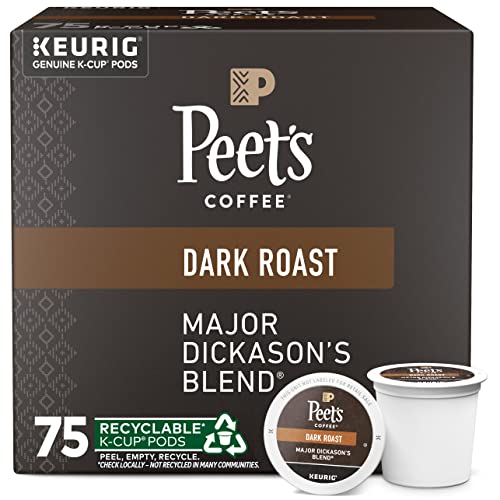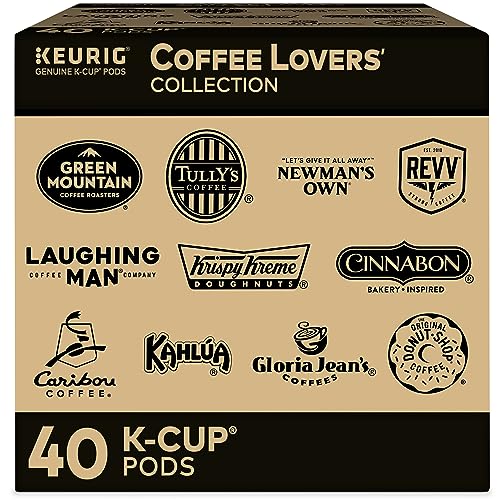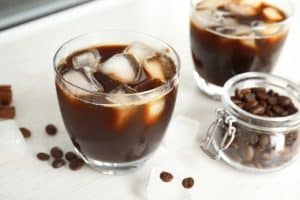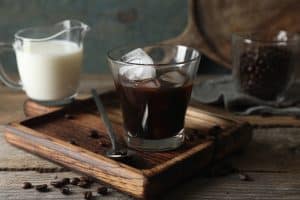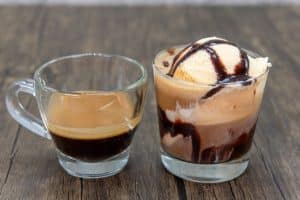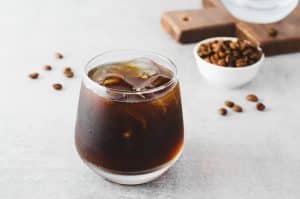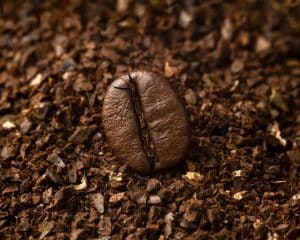How Much Caffeine Is In A Keurig Coffee Pod?

Keurig coffee makers have transformed the coffee experience, offering convenience and a wide array of flavors with their K-Cups. Whether it’s your morning ritual or a caffeine boost during the day, Keurig has become a go-to choice for many. Just pop in a single-serve pod and press a button—no grinding, no kettle, no filters, no fuss!
Curious if your favorite little K-Cup packs the same caffeine punch as a standard cup of coffee? Keep reading to learn more. Understanding the caffeine content in Keurig cups empowers coffee lovers to tailor their caffeine intake to their preferences and sensitivity levels. Whether you crave a bold, high-caffeine brew or a calming decaf option, Keurig offers something for everyone.
Amount of Caffeine In A K-Cup Coffee
According to Keurig, most K-Cups contain between 75 and 150 mg of caffeine per 250 ml (8 oz) cup, while even decaffeinated options typically contain between 2 to 4 mg per cup of the same size.
Several factors influence caffeine content, with roast level and coffee species being key contributors to the variance in K-Cup caffeine levels.
Keurig Cup: Roast Levels And Caffeine Content
The roast level of coffee beans, whether intended for Keurig or traditional coffee makers, significantly influences caffeine levels.
During roasting, beans undergo a process where they lose moisture and caffeine due to exposure to heat. Darker roasts, which are roasted for longer periods, typically have less caffeine compared to lighter roasts, as they lose more caffeine during the extended roasting process. Despite the bold flavor associated with dark roasts, lighter roasts generally contain more caffeine.
To address this, some roasters like Death Wish Coffee and Starbucks have developed recipes for dark roast coffee with high caffeine content. They have also introduced K-Cup options for these high-caffeine blends, providing coffee enthusiasts with robust flavor and ample caffeine in convenient single-serve pods.
Keurig Cup: Type Of Beans And Caffeine Content
Coffee’s caffeine content hinges significantly on the type of coffee bean utilized. There are two main species: robusta and arabica, which vary in their caffeine concentrations.
Robusta typically boasts higher caffeine levels, ranging from 2.2% to 2.7%, whereas arabica tends to hover around 1.2% to 1.5%. To simplify further, arabica coffee contains approximately 1.54 mg of caffeine per gram of coffee, while robusta contains about 1.82 mg per gram, as evidenced by a 2021 study titled “Determination of Caffeine Content in Arabica and Robusta Green Coffee of Indian Origin“. It’s important to emphasize that these measurements were conducted on green coffee beans prior to roasting.
Despite arabica’s popularity for its diverse flavor profiles, robusta is favored for its higher caffeine content and easier cultivation. To balance flavor and caffeine potency, many roasters blend robusta and arabica beans, creating coffee blends with robust flavor profiles and heightened caffeine levels.

Strongest K-Cups With the Most Caffeine
As someone who relies on multiple cups of coffee to power through the day, I often question whether my K-Cup’s caffeine content suffices or if I need a stronger boost!
After some investigation and a considerable amount of caffeine, I’ve uncovered some of the finest extra-caffeinated K-Cups. Ideal for those seeking an added energy kick to kickstart their mornings.
1. Black Insomnia Coffee Extreme Caffeine
Black Insomnia claims that this is the strongest coffee in the world that this has 6 times more caffeine than a normal 12 oz cup. While that is probably an overstatement, this is one of the stronger K-pod varieties.
2. DEATH WISH Death Cups
Popular roaster DEATH WISH is known for its high caffeine content coffee and is a fan favorite for coffee junkies internationally. Their Death Cups boast 420 mg of caffeine per pod, more than five times the average K-Cup caffeine content.
3. Wake the Hell Up! Coffee Pods
If the brand’s name isn’t sufficient to rouse you, their ultra-caffeinated coffee certainly will. Crafted from a blend of Arabica and Robusta beans, each serving packs an impressive 325mg of caffeine. Plus, it’s available in a range of enticing flavors.
4. VitaCup Lightning Coffee Pods
If the caffeine levels in the previously mentioned K-cups feel overwhelming, but you’re still craving a bit more kick than your usual cup of joe, VitaCup has the solution. Their K-cup boasts double the caffeine for that extra boost you need.
K-Cups with Regular Caffeine Content
Often times, a standard cup of coffee is perfectly adequate. There’s no need for the highest caffeine content all the time. In such situations, these K-Cups are just right.
1. Starbucks Pike Place Roast
Starbucks’ Pike Place Roast is a crowd favorite, offering a balanced caffeine kick without overwhelming effects. Each 8 oz serving typically contains around 100 mg of caffeine.
2. Caribou Coffee’s Caribou Blend
Caribou Coffee’s Caribou Blend packs a bit more caffeine punch than Starbucks’ Pike Place Roast, averaging around 150 mg per 8 oz serving. While it’s on the higher end of regular K-Cup caffeine content, it’s nowhere near the levels of extra-caffeinated options like DEATH WISH.
3. Peet’s Coffee Major Dickason’s Blend
This rich and complex Major Dickason’s Blend from Peet’s is adored by coffee enthusiasts and offers a caffeine content similar to Starbucks’ Pike Place, averaging around 100 mg per pod.
4. Keurig Coffee Lovers’ Collection Sampler Pack
Struggling to choose among coffee flavors? This Coffee Lover’s Sampler Pack guarantees a variety of options to suit your taste. Each pod typically contains caffeine ranging from 75 mg to 150 mg.
Flavorful Decaf K-Cups
If you’re looking to minimize your caffeine intake but still savor the taste of coffee, don’t worry, we’ve got you covered! Decaf K-Cups are readily available and offer the same convenience and enjoyment as regular coffee pods.
1. The Original Donut Shop DECAF Coffee
In an 8 oz serving, the Original Donut Shop Decaf Coffee contains only 4 mg of caffeine. This minimal caffeine content falls well below the range typically found in regular K-Cups, making it unlikely for you to feel any effects from caffeine consumption.
2. Peet’s Coffee, Dark Roast Decaffeinated Coffee
On days when I desire the flavor of coffee without the caffeine kick, I turn to Peet’s House Blend Decaf. It delivers the rich taste of regular coffee with only 2.4 mg of caffeine per 8 oz serving.
3. Maud’s Dark Roast Decaf Coffee (Decaf Tall Dark and Handsome)
Similarly, Maud’s Dark Roast Decaf Coffee, Tall Dark and Handsome, contains less than 5 mg of caffeine per 8 oz serving. Enjoy a comforting cup of Maud’s at the end of your day without worrying about sleepless nights.

FAQs
What Is A K-Cup?
Keurig coffee makers brew single servings of coffee using K-Cups, which are small plastic pods filled with enough ground coffee for one cup. K-Cup stands for Keurig Cup.
Does A Light Roast Have More Caffeine Than A Dark Roast?
The caffeine content in coffee beans can vary depending on factors like the type of bean and the brewing method. But generally, lighter roasts tend to have slightly more caffeine than darker roasts, whether brewed using K-Cups or whole beans.
Do Robusta Beans Have More Caffeine?
Yes, Robusta coffee beans typically contain more caffeine than Arabica coffee beans. Robusta beans generally have a caffeine content ranging from 2.2% to 2.7%, while Arabica beans have a lower caffeine content, falling closer to 1.2% to 1.5%.
Can I Reuse A K-Cup To Reduce Caffeine Intake?
No, it is not recommended to reuse a Keurig coffee pod to reduce caffeine intake. Reusing a coffee pod can result in a weaker cup of coffee, but it will not significantly reduce the caffeine content. If you’re looking to reduce your caffeine intake, it’s best to choose a decaf or low-caffeine coffee pod instead.
How Does The Caffeine Content Compare Between Keurig Pods And Espresso?
The caffeine content in a serving of espresso is typically higher than that of a Keurig coffee pod. A standard espresso shot contains approximately 63 mg of caffeine per ounce, while a Keurig pod typically contains around 75 to 150 mg of caffeine per 6 fluid ounces.
Last Drop
So, how much caffeine can you expect from a Keurig cup? On average, regular coffee K-Cups contain anywhere from 75 mg to 150 mg of caffeine, though some options may fall outside this range.
For those who need an extra kick, some coffee roasters offer K-Cups with caffeine levels ranging from 400 to 1000 mg per serving – perfect for those who need a serious morning boost.
If you’re looking to cut back on caffeine without giving up your coffee fix, decaf K-Cups are a great option. Just keep in mind that even decaffeinated coffees can contain up to 5 mg of caffeine per serving, so they’re not entirely caffeine-free.
But choosing the right K-Cup isn’t just about caffeine content; it’s also about flavor, texture, and aroma. With a wide range of options available, from small-batch roasters to well-known brands like Starbucks and Peet’s, there’s something for everyone’s taste buds.
Whether you prefer decaf or ultra-caffeinated, K-Cups offer a convenient and versatile way to enjoy your favorite coffee flavors right at home.
Mary is a writer at Caffe Streets. She works in the healthcare field and finds pleasure in learning, researching, and sharing coffee-related information with coffee enthusiasts worldwide. Her coffee of choice is the affogato, a beverage/dessert she deems simply perfection.







